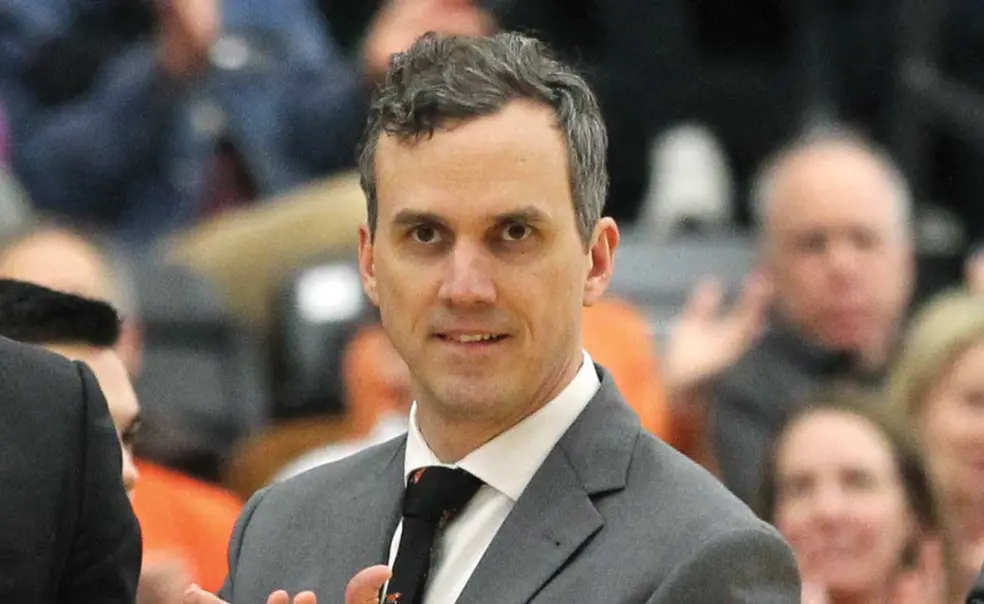COVID Has Changed the Game for Princeton Coaches Recruiting
With competition prohibited by the Ivy League because of COVID-19 concerns, this fall season felt like the spring for Bob Surace ’90. The Princeton football coach could focus more on recruiting than game-planning.
“It’s created some challenges,” said Surace. “It’s also created some opportunities. As a coach, I’ve grown because the No. 1 thing in recruiting is relationships and getting to know kids.”
The NCAA stopped all in-person contact through at least Dec. 31, meaning coaches seeking recruits can’t attend competitions, visit homes, hold camps and clinics, or bring prospective student-athletes to campus. They’ve turned to video conferencing, phone calls, and texting.
“You’re getting, maybe, more time with families sitting down together via Zoom over the last few months,” said men’s basketball coach Mitch Henderson ’98. “It’s really a different kind of a time, but like everybody else, I think we’ve made the best of it.”
After working out early mornings with his son during the fall, Surace has been texting recruits. He’s tried to send tidbits about Princeton’s football program that would “put a smile on their face every morning.” That positivity leads to “much more communication as we move forward.”
In past years, every extra scrap of his time went to watching high school videos, but it was rushed, Surace said. Without games to prepare for, “I feel like it has given us a chance to do our jobs better as recruiters.”
Henderson estimates he has watched 10 times as much video as he did before the pandemic but said it’s not the same as seeing a recruit’s mannerisms, reactions, and interactions in person.
“In one way, I really like the process right now because recruiting is the backbone of everything we do. ... You can find a lot of really good kids out there that no one knows about.” — Mitch Henderson ’98, men’s basketball coach
“We get quarantine videos that [athletes] are posting — them working in their backyards with their individual skills and seeing their training regimens,” said women’s lacrosse coach Chris Sailer. “The players were really creative this year. I definitely appreciated that. We got to see a little of their personality.”
Women’s basketball coach Carla Berube has four high school seniors committed to the Princeton admissions process. She has yet to see one play in person, magnifying the need to build a connection through calls. It’s the second-year coach’s first full recruiting class at Princeton, though every coach is in the same uncharted territory.
“We’ve been able to share quite a bit,” said Berube. “We’ve had a lot of meetings and talked about what we’re doing with our teams or recruiting-wise. I’ve been very pleased with the help that all the coaches have been to us and me.”
Without recruit visits to the campus or team, there is more weight on coaches to represent their programs. Recruits are permitted to talk to current team players, but a coach must be present on the call, which could cut into a player’s forthrightness. They’re also relying on videos: Each Princeton athletic program has been challenged to design its own creative video presentations along with virtual tours.
“It’s forced us to do such a diligent, incredible job showing them our culture,” said Surace. “We’re showing them our campus — through Zoom tours — really digging into constant communication to replace the actual face-to-face meetings.”
Coaches were helped this year by the groundwork they’d laid with Class of 2025 and 2026 recruits before the pandemic hit. Typically they evaluate recruits at least two years before the athletes could attend Princeton — the earliest they’re allowed to do so. Coaches also know some players from camps and clinics at Princeton, but if the ban on competition is extended, that pipeline will eventually run dry.
With no guarantee of in-person visits to come, recruits went ahead with commitments faster this year. Henderson said they’re generally frustrated and a little confused. Unable to play in front of coaches, they’re relying on the people closest to them for guidance and doing the best they can.
“In one way, I really like the process right now because recruiting is the backbone of everything that we do,” said Henderson. “If you hustle and you build relationships with kids, it’s an imperfect process for them and for us, but you can find a lot of really good kids out there that no one knows about.”












No responses yet